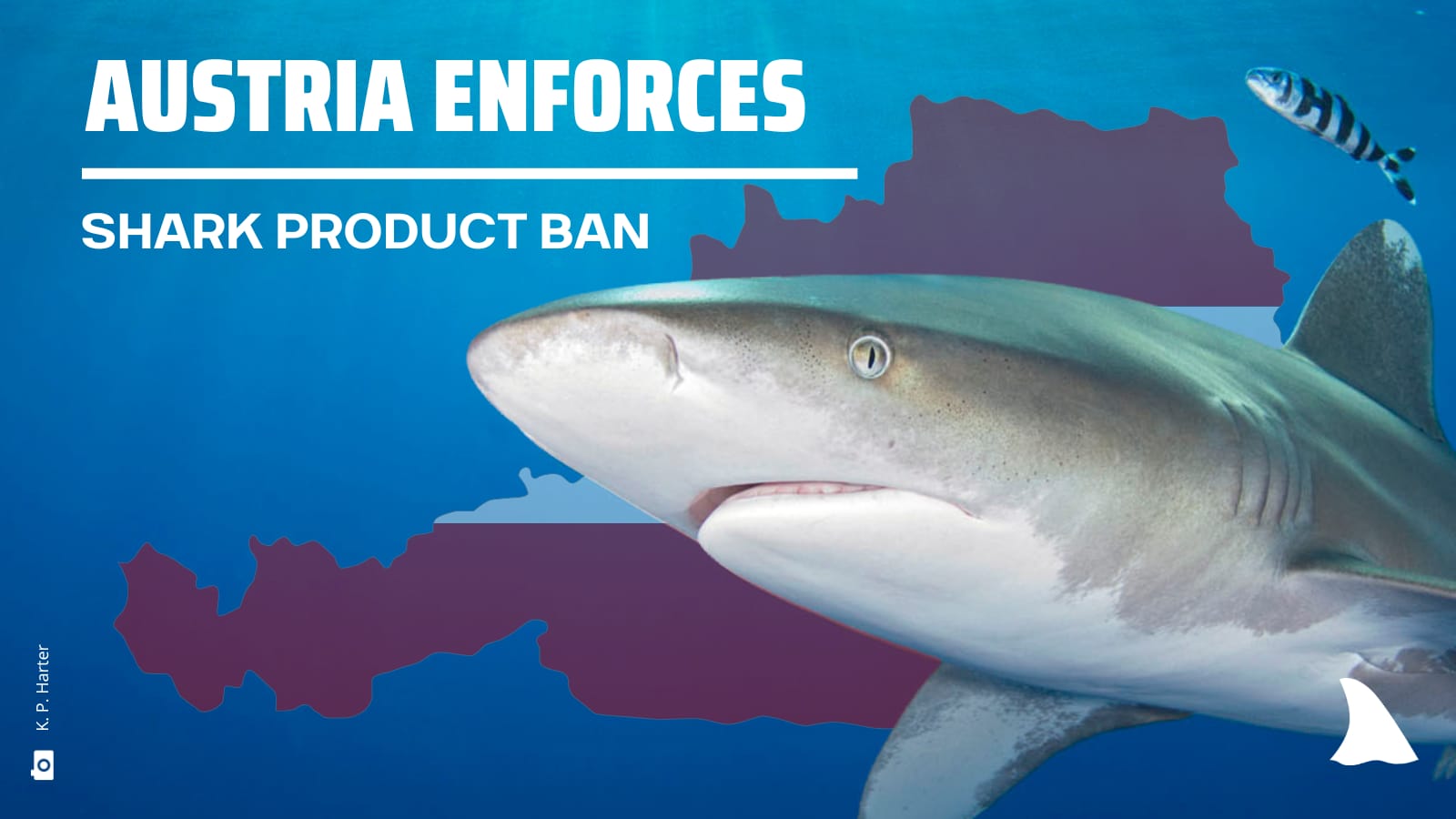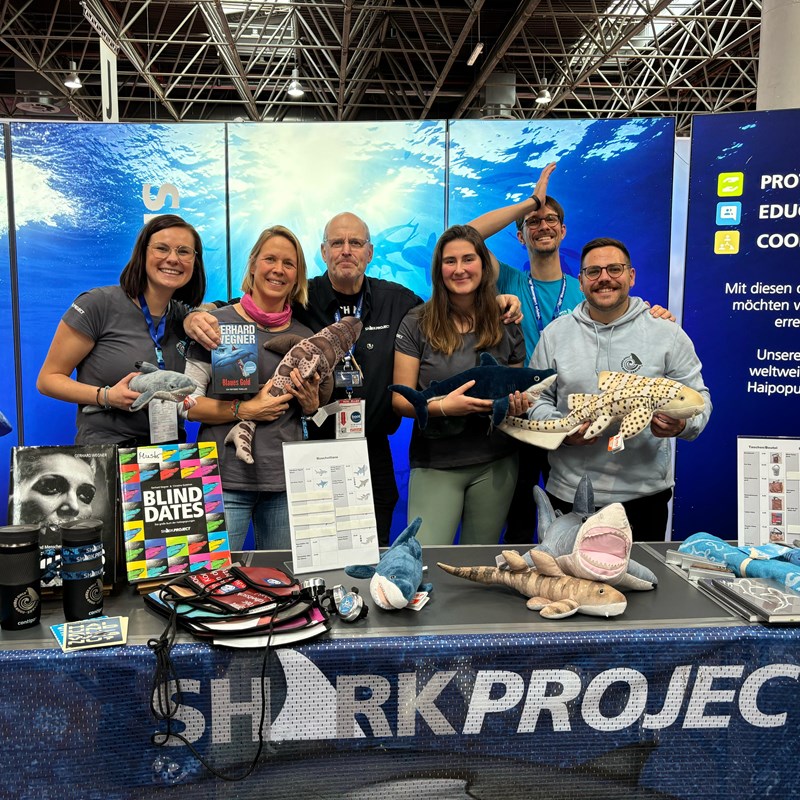

Seafood Eco-Label MSC's Revised Standard
11. May, 2023
Big Blue Future or Big Blue Failure?
In its final assessment of the Marine Stewardship Council's new certification standard for seafood, the international marine conservation coalition Make Stewardship Count concludes that it does not go far enough to truly protect endangered species.
- What is actually behind the new standards?
- detailed assessment according to traffic light system
- real marine protection required
Make Stewardship Count - Seafood Eco-Label MSC's Revised Standard: Big Blue Future or Big Blue Failure?
Securing Standards
We at Sharkproject have been an active partner behind the marine conservation coalition "Make Stewardship Count" since the beginning. Therefore, our marine biologist Dr. Iris Ziegler is also a member of the Steering Committee. You can read about the project's progress so far here.
The latest press release of the coalition can be downloaded on the left.
Nearly every single scorecard is on red or yellow
The coalition has taken a closer look at individual contents of the new MSC standard. The sobering result: the assessment is either "below expectations" (red) or "improving" (yellow). Only one sub-content received the rating "meets expectations" (green).
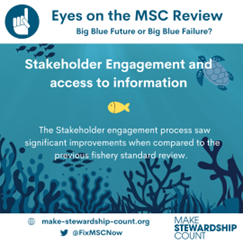
©
Stakeholder engagement and access to information is ranked yellow.
There were significant improvements during this review compared to the previous review. Improvements include an increase in opportunities for stakeholders to meaningfully engage in the process and access information to inform their feedback.
Stakeholder selection, use of feedback in decision making were unclear at times, with several delays and unclear timelines throughout the process.
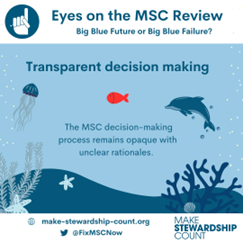
©
The decision making process was a notable shortcoming during the review, and is ranked red.
Many changes to the Standard were made between the final consultation survey and releasing the final Standard, without explanation or consultation with stakeholders, which reversed what could have been some of the strongest changes to the Standard.
As highly engaged stakeholders, it was disappointing to have seen so much improvement in the process and effort from the MSC, only to have the opaque decision making process thwart several key improvements at the final stage and with little rationale.
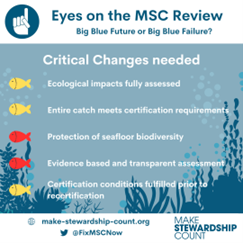
©
Ahead of the review we identified several key areas of the MSC Fisheries Standard, in particular under principle 2, minimising environmental impacts.
This multi-year review was an historic opportunity for MSC to enact changes to ensure that certified fisheries follow global best practice and to drive real change on the water.
Our recommendations included implementing a ‘fins naturally attached’ policy as a prerequisite for certification, protecting seafloor biodiversity, and minimising the impacts of MSC fisheries on endangered, threatened and protected species and more.
Although the final Standard, to be implemented on May 1, does contain some areas of improvement, the final scorecards remain almost entirely red and yellow, as many of the changes we had called for failed to materialise.
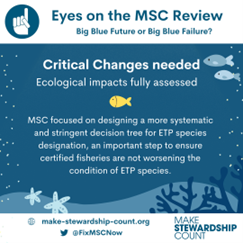
©
MSC designed an improved decision tree for designating species as endangered, threatened and protected species thereby improving the process significantly.
Unfortunately, two important categories are not included in the ETP designation requirements; those species assessed as Vulnerable by IUCN and those that have yet to be listed under national legislations but have been assessed as Endangered or Threatened by national level science bodies .
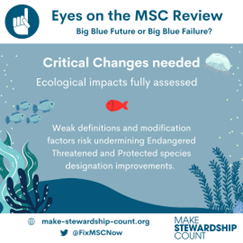
©
Ecological Impacts fully assessed
Despite improvements to the ETP decision tree, the new Standard allows species designated as ETP to be considered as an in-scope species and eligible for certification as an MSC product by introducing ‘modification factors’. These factors are not precautious enough and will likely allow economically valuable ETP species to become MSC certified, despite not being well managed or recovering.
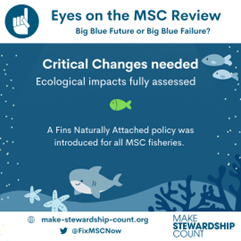
©
Fins Naturally Attached
A notable and welcome improvement to the new Standard is the requirement for certified fisheries to have a Fins Naturally Attached (FNA) policy in place, with no exceptions.
However, without mandatory levels of compliance monitoring, the risk is that this will be mostly a paper exercise and not drive real changes for sharks on the water, especially since most fisheries will have until 2028, six years from now, before having to comply with the new requirement.
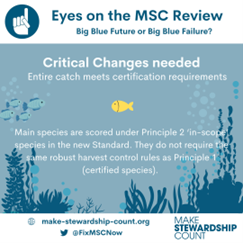
©
Entire catch meets certification requirements
Our request to ensure the entire catch meets certification requirements, with all ‘main species’ of catch managed in the same way as the target species (P1), were not met. The main in-scope species are scored under P2, which do not have the same robust harvest control rules.
We had hoped to see overfishing prohibited for all ‘main’ species of the catch, however, no changes were made during this review.
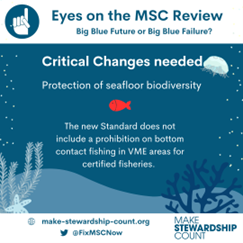
©
Protection of seafloor biodiversity
We urged MSC to implement changes for the protection of seafloor biodiversity including a prohibition on bottom contact fishing in Vulnerable Marine Ecosystems (VME), and requirements to limit impacts on all benthic habitats.
No such changes were made, and the Standard may still permit MSC certified fisheries to use bottom contact fishing methods in sensitive areas.
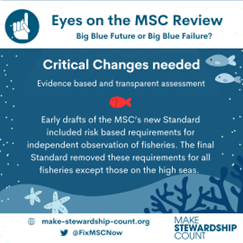
©
Evidence based transparent assessment
We called for risk based qualitative and quantitative data requirements for bycatch reporting as a prerequisite for certification. Although this was discussed throughout the review, such an approach has not been adopted.
The new Standard includes only one quantitative threshold for ‘independent monitoring’: 30% coverage for fisheries operating in the
For fisheries not managed by RFMOs, this will likely result in lower levels of monitoring for very similar fisheries and the certifier may also consider lower levels as adequate.
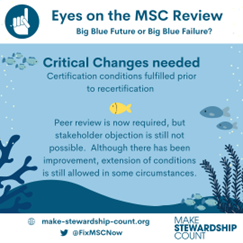
©
Critical Changes Needed
One of our recommendations was for no fisheries to be recertified until all conditions of their previous certification are fulfilled. In 2019, the MSC did tighten the requirements for having conditions extended. However, in certain cases fisheries are able to be recertified without fulfilling their conditions, leading to a ‘yellow’ rank.

